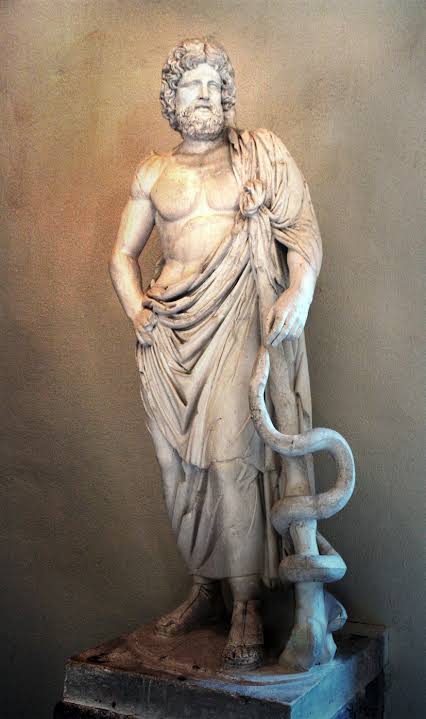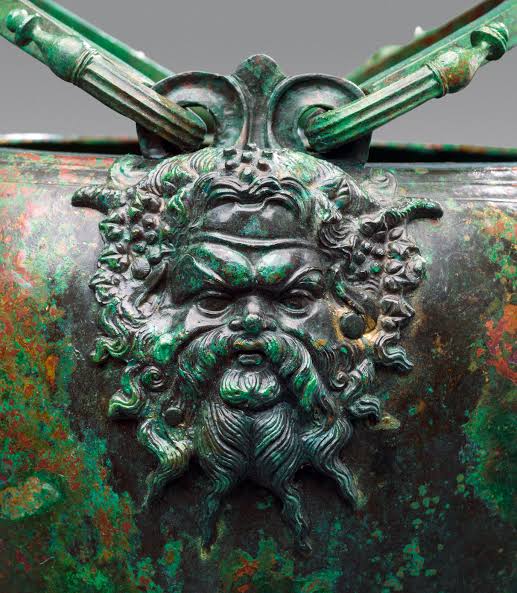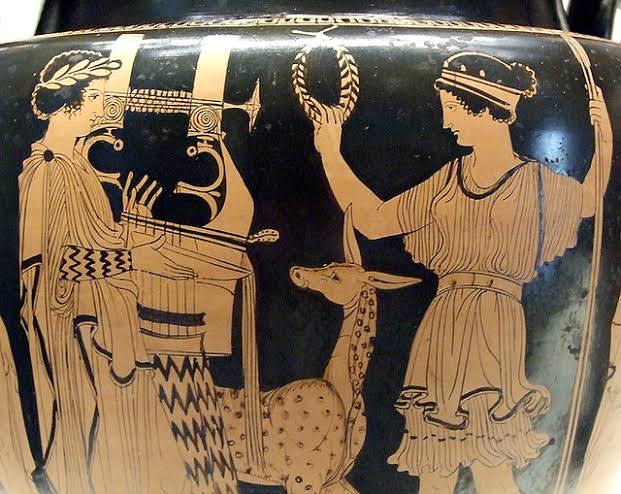Here are a few of many instances of ancient “records” of gods and heroes acting in historical times, sometimes within little more than a generation of the one documenting the event. Hopefully, these extracts will help dispel the myth that ancient Greek gods and heroes belonged exclusively to some way-off remote “heroic age” — with the inference, of course, that the gospels are not as far removed from Greco-Roman mythical stories as is sometimes claimed.
Asclepius and Amphiaraus regularly worked cures in their sanctuaries while their clients slept, and sometimes even met their patients face-to-face—on one occasion, Asclepius arrived dressed in shining golden armor. (Johnston, 308)

46 years at most between the god’s act of healing and the written account:
A Greek poem written in the “late fourth century BCE” (Claus, 178) / “ca. 300 B.C.” (SEG 53-365) in honour of the god Apollo and hero-god Asclepius describes an event when Asclepius in “shining golden armour” appeared and spoke to a boy before speeding off to fight to defend Sparta from King Philip of Macedon — in 346 BCE.
And of your power, Asclepius, you gave this example in the days when Philip, wishing to destroy the royal authority, led his army against Sparta. To them from Epidaurus Asclepius came as a helper, honouring the race of Heracles, which consequently Zeus spared. He came at the time when the sick boy came from Bosporus. Shining in your golden armour, you met him as he approached Asclepius; and when the boy beheld you, he drew near to you, stretching forth his hand and entreated you in suppliant words :
“I have no share in your gifts, Asclepius Paean ; have pity on me.”
Then you addressed these words to me clearly : “Take heart, for I shall come to you in due time – just wait here – after I have rescued the Lacedaemonians from grievous doom because they justly guard the precepts of Apollo which Lycurgus ordained for the city, after he had consulted the oracle.”
And so he went to Sparta. But my thoughts stirred me to announce the divinity’s advent to the Lacedaemonians, everything in exact order. They listened to me as I spoke the message of safety, Asclepius, and you saved them. And they called upon all to welcome you with honours due a guest, proclaiming you the Saviour of spacious Lacedaemon. These words, O far the best of all the gods, Isyllus set up for you, honouring your power, O Lord, as is seemly.
50 years from a god meeting a famous Greek until its recording:

The Battle of Marathon was in 490 and Herodotus wrote Histories around 440 BCE.
Before they left the city, the Athenian generals sent off a message to Sparta. The messenger was an Athenian named Pheidippides, a trained runner still in the practice of his profession. According to the account he gave the Athenians on his return, Pheidippides met the god Pan on Mount Parthenium, above Tegea. Pan, he said, called him by name and told him to ask the Athenians why they paid him no attention, in spite of his friendliness towards them and the fact that he had often been useful to them in the past, and would be so again in the future. The Athenians believed Pheidippides’ story, and when their affairs were once more in a prosperous state, they built a shrine to Pan under the Acropolis, and from the time his message was received they have held an annual ceremony, with a torch-race and sacrifices, to court his protection.
(Herodotus: 6.105 – Perseus site)
40 or 50 years from Vespasian’s miracles to their documentation:
Suetonius wrote during the reign of Hadrian (117-138) and Vespasian ruled from 69 to 79 CE:
A common man who had lost his sight and another who was lame approached him together as he sat before the tribunal, begging for the remedy for their ailments which Serapis had revealed in a dream; for he could heal eyes by spitting upon them and make whole a leg if he deigned to touch it with his heel. Although he had little faith that this could possibly succeed and indeed did not dare to put it to the test, finally, at the insistence of his friends, he undertook both actions in public before an assembly and met with success. At the same time, with the guidance of seers, some vessels of ancient workmanship were dug up in a sacred spot at Tegea in Arcadia, bearing an image very like that of Vespasian.
(Suetonius: Vespasian, 7 – Perseus site)
Apollo et al fought alongside armies in historical times:

Apollo’s worshipers were threatened by an invasion of Gauls in 279 BCE. Supernatural women — perhaps his sisters Artemis and Athena — appeared alongside him in the battle. Multiple traditions survive, and I list three here from the first century BCE.
Such an apparition is said to have occurred to Brennus, and to his Gallic troops, when he was waging an impious war upon the temple of Apollo at Delphi. For on that occasion it is reported that the Pythian priestess pronounced these words:
“I and the white virgins will provide for the future.”
In accordance with which, it happened that the Gauls fancied that they saw white virgins bearing arms against them, and that their entire army was overwhelmed in the snow.
(Cicero, On Divination, 1.37)
Brennus, the king of the Gauls, accompanied by one hundred and fifty thousand infantry, armed with long shields, and ten thousand cavalry, together with a horde of camp followers, large numbers of traders, and two thousand waggons, invaded Macedonia and engaged in battle. Having in this conflict lost many men . . . as lacking sufficient strength . . . when later he advanced into Greece and to the oracle at Delphi, which he wished to plunder. In the mighty battle fought there he lost tens of thousands of his comrades-in‑arms, and Brennus himself was three times wounded. Weighed down and near to death, he assembled his host there and spoke to the Gauls. He advised them to kill him and all the wounded, to burn their waggons, and to return home unburdened; he advised them also to make Cichorius king. Then, after drinking deeply of undiluted wine, Brennus slew himself. After Cichorius had given him burial, he killed the wounded and those who were victims of cold and starvation some twenty thousand in all; and so he began the journey homeward with the rest by the same route. In difficult terrain the Greeks would attack and cut off those in the rear, and carried off all their baggage. On the way to Thermopylae, food being scarce there, they abandoned twenty thousand more men. All the rest perished as they were going through the country of the Dardani, and not a single man was left to return home.
Brennus, the king of the Gauls, on entering a temple found no dedications of gold or silver, and when he came only upon images of stone and wood he laughed at them, to think that men, believing that gods have human form, should set up their images in wood and stone.
At the time of the Gallic invasion the inhabitants of Delphi, seeing that danger was at hand, asked the god if they should remove the treasures, the children, and the women from the shrine to the most strongly fortified of the neighbouring cities. The Pythia replied to the Delphians that the god commanded them to leave in place in the shrine the dedications and whatever else pertained to the adornment of the gods; for the god, and with him the White Maidens, would protect all. As there were in the sacred precinct two temples of extreme antiquity, one of Athena Pronaia and one of Artemis, they assumed that these goddesses were the “White Maidens” named in the oracle.
(Diodorus Siculus, 22.9)
Brennus out of all his Army made choyce for this service of threescore and five thou∣sand foot. The Army of the Delphians and their Associates did not amount to above fourteen thousand, in contempt of whom, Brennus the more to encourage his men, did shew them the greatness of the booty, and the Statues drawn with four horse (of which a vast number were seen afar off) all with solid gold; moreover he affirmed to them that the booty was far more considerable in the weight then in the show. With this informa∣tion the Gauls being as much inflamed as with their last nights Wine, did fall upon the onset without respect of danger. The Del∣phians on the other side, putting their con∣fidence in their god, and not in their own strength, did with contempt oppose their Ene∣mies, and from the top of the Hill, some of them with Arms, and some with stones did overwhelm and repel the Gauls in their Scalado. In the heat of this encounter, on a sudden the Priests of all the Temples, & the Prophets themselves with their hair dishevelled in their most solemn habits and fillets did tremble all with in∣dignation, & did run forth mad into the Front of the Army: where the fight most violently was maintained, They cryed out that their god was come down, & that they beheld him leaping into the Temple, laughing from the opened Roofs thereof; for whiles they most humbly emplored his help, a young man as admirable in his beauty as the tall proportion of his body, with two armed Virgins who were his Companions did appear, and did meet them out of the two adjoyning Temples of Diana and Mi∣nerva; neither did they onely behold them with their eyes, but they heard also the twang of his Bow, and the clashing of his Armour; they therefore conjured them by the utmost Imprecations, that they would not delay to make a thorow-dispatch upon their Enemies, the gods being their Leaders, and to joyn them∣selves Companions with them in the Victory; with these words being enflamed, they did all throw themselves upon the points of their Ene∣mies swords, and immediately they perceived the presence of their god; For part of the Hill (being torn off by an Earthquake) did over∣whelm the Army of the Gauls, and the most thick and pointed wedges did fall to the ground not without some wounds to the Delphians. Immediately there followed a great Tempest of hayl, lightning, & thunder which devoured those who fainted by reason of their wounds. Bren∣nus their General, when he could not endure the anguish of his wounds, did end his life with his Poynedo. Belgius the other of their Gene∣rals, the Authors of this war being punished, departed in a flying march out of Greece with ten thousand of his Associates: But Fortune was not more propitious to them flying; for fearful as they were, there was no night without rain or cold, nor day without labor and danger, but daily storms and snow concrete with Ice, and hunger, and weariness, and above all the great evil of too much watching did consume the miserable Relicks of the unhappy war. The people also and Nations through which they marched, did pursue them flying before them as a prey; By which means it came to pass, that not one of so great an Army, who not long before being too confident in their strength and numbers presumed to plunder the gods, did now remain to witness the remem∣brance of so great an overthrow.
(Trogus Pompeius, 24:8)

Appearance of the goddess Athena in historical times:
An inscription on the Temple of Athena on the island of Lindos (the Lindian Chronicle) from the first century BCE records the following event that also occurred in 490 BCE – at the time of the Battle of Marathon:
“When Darius, King of Persia, sent forth a great army for the purpose of enslaving Hellas, this island was the first which his fleet visited. The people in the country were terrified at the approach of the Persians and fled for safety to all the strongholds, most of them gathering at Lindus. Thereupon the barbarians set about to besiege them, until the Lindians, sore-pressed by a water shortage, were minded to hand over the city to the enemy. Right at this juncture the Goddess stood over one of the magistrates in his sleep and bade him be of good courage, since she herself would procure, by intercession with her father, the water they needed. The one who saw the vision rehearsed to the citizens Athena’s command. So they investigated and found that they had only enough water to last for five days, and accordingly they asked the barbarians for a truce for just that number of days, saying that Athena had sent to her father for help, and that if help did not come in the specified time, they would surrender the city. When Datis, the admiral of Darius, heard this request, he immediately burst out laughing. But the next day, when a great cloud gathered about the Acropolis and a heavy shower fell inside the cloud, so that contrary to all expectations (paradoxos) the besieged had plenty of water, while the Persian army suffered for lack of it, the barbarian was struck by the epiphany of the Goddess. He took off his personal adornment and sent it as an offering — his mantle, his necklace, and his bracelets, and in addition his tiara, his scimitar, and even his chariot, which formerly was preserved here, but was burned along with most of the offerings when the priest of Helios was Eucles, son of Astyanactidas (probably soon after 350 BCE), when the Temple caught fire. As for Datis, he set forth on the business before him, after establishing peace with the besieged and declaring publicly, “These men are protected by the Gods”.
(From F.G. Grant, Hellenistic Religions, New York 1953)
One frequently comes across such similar types of events where gods or heroes appear or speak in various ways to their devotees. The activity of the gods and heroes was not believed to have ended in some distant heroic past. They remained ever-present and continued to act in history (including “recent history”) and the present. I have selected from such “contemporary myths” as listed for illustrative purposes by Sarah Iles Johnston:
Johnston, Sarah. 2015. “The Greek Mythic Story World.” Arethusa 48 (September): 283–311. https://doi.org/10.1353/are.2015.0008.

The ever-present Heracles:
We know, moreover, that in the Hellenistic and Roman periods homeowners inscribed poetic verses on their houses that proclaimed Heracles’ protective power, a practice that is alleged to have annoyed Diogenes the Cynic, who once complained about a pair of iambic verses that a newlywed had inscribed on his new house. This so-called Kallinikos-inscription runs as follows:
ὁ τοῦ Διὸς παῖς καλλίνικος Ἡρακλῆς
ἐνθάδε κατοικεῖ· μηδὲν εἰσίτω κακόν.The son of Zeus, resplendent in victory, Heracles,
lives here. Let no evil enter!(Faraone, Christopher. 2013. “Heraclean Labors on Ancient Greek Amulets: Myth into Magic or Magic into Myth?” In Mito y Magia En Grecia y Roma, edited by Emilio Suárez de la Torre and Aurelio Pérez Jiménez, 85–120. Barcelona: Libros Portico. p. 87)
Neil Godfrey
Latest posts by Neil Godfrey (see all)
- What Others have Written About Galatians (and Christian Origins) – Rudolf Steck - 2024-07-24 09:24:46 GMT+0000
- What Others have Written About Galatians – Alfred Loisy - 2024-07-17 22:13:19 GMT+0000
- What Others have Written About Galatians – Pierson and Naber - 2024-07-09 05:08:40 GMT+0000
If you enjoyed this post, please consider donating to Vridar. Thanks!

Oh sure but were there 500 anonymous witnesses?
Good point. I’ll post some more with multiple witnesses. Though some of the ones in the post evidently did have crowds witnessing them.
Here’s another one, from a 5th-century Greek historian named Zosimus. He was writing about Alaric’s invasion of Greece, which occurred before Zosimus’s lifetime, but he may have derived his info from another historian named Olympiodorus, who was alive at that time.
“When Alaric advanced with all his forces against the city [Athens], he saw Minerva, its tutelar goddess, walking along the wall, in the same form in which she is represented among the statues of the gods, which is in armour ready to attack those who oppose her. Before the walls he saw Achilles standing in an heroic posture, such as that in which Homer represents him engaging the Trojans so furiously in revenge for the death of Patroclus. Alaric, being struck with awe by this sight, desisted from his attempt on the city, and sent heralds with proposals for peace. These being accepted, and oaths mutually exchanged, Alaric entered Athens with a small number of troops. He was there entertained with all possible civility, and treated with great hospitality; after which he received some presents, and departed, leaving the city and all Attica uninjured. Thus Athens, which was the only place that was preserved from the earthquake which happened under the reign of Valens, and shook the whole of Greece, as I mentioned in the preceding book, escaped also from this extreme danger.”
— Zosimus, New History, Book 5
Not that long “before his lifetime”. No more than a century, which is only two or three generations.